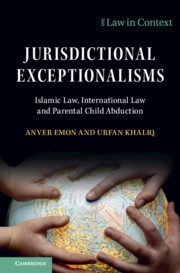Book contents
- Jurisdictional Exceptionalisms
- Law in Context Series
- Jurisdictional Exceptionalisms
- Copyright page
- Dedication
- Contents
- Tables
- Preface and Acknowledgements
- Abbreviations
- 1 Introduction
- Part I
- Part II
- 4 Islamic Law and Child Custody
- 5 Jurisdictional Exceptionalism and Islamic Law
- 6 Private International Law, Muslim Family Law States, and Strategic Jurisdiction
- 7 Conclusion
- Bibliography
- Index
5 - Jurisdictional Exceptionalism and Islamic Law
from Part II
Published online by Cambridge University Press: 23 July 2021
- Jurisdictional Exceptionalisms
- Law in Context Series
- Jurisdictional Exceptionalisms
- Copyright page
- Dedication
- Contents
- Tables
- Preface and Acknowledgements
- Abbreviations
- 1 Introduction
- Part I
- Part II
- 4 Islamic Law and Child Custody
- 5 Jurisdictional Exceptionalism and Islamic Law
- 6 Private International Law, Muslim Family Law States, and Strategic Jurisdiction
- 7 Conclusion
- Bibliography
- Index
Summary
Chapter 5 examines the traditional Islamic rules on jurisdiction. Modern rules on the jurisdiction of domestic courts exist in the context of the system of States, whereas the historic Islamic rules on jurisdiction and the assumptions upon which they were based relate to a system which was premised upon an imperial ideal that approached core concepts of modern Private International Law from different vantage points. The manner and extent to which pre-modern substantive rules, coupled with an imperial imagination, have permeated into the modern domestic law of Muslim Family Law States differs between such states, but nonetheless reveals a shared problem that we suggest animates the ongoing debates around the 1980 Hague Abduction Convention. Policies of ‘Islamisation’ pursued in certain Muslim Family Law States have at various times sought to reintroduce selected interpretations of Islam into the areas of domestic law pertinent to the study. Thus, the process is not necessarily a linear one over time where the historic rules have become marginalised, but rather one where there is an ebb and flow over time – the extent of which differs between Muslim Family Law States.
Keywords
- Type
- Chapter
- Information
- Jurisdictional ExceptionalismsIslamic Law, International Law and Parental Child Abduction, pp. 218 - 295Publisher: Cambridge University PressPrint publication year: 2021

